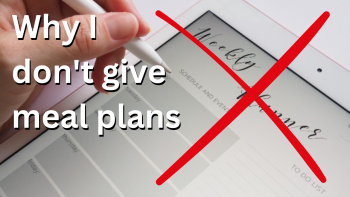When you're trying to manage Endometriosis symptoms, a meal plan can sound like the perfect solution. After all, wouldn’t it be easier if someone just told you exactly what to eat?
I get it—and earlier this year, when I asked for your feedback in a survey, a lot of you asked for meal plans and recipes. I’m so grateful for your input, and I always want to give you the best support I can.
But this is one request I’m not saying yes to—and today, I want to explain why.
This decision isn’t about being difficult or withholding something helpful. It's about making sure that what I offer you actually works to support your health long-term. Let me take you through it.
- I’m a Nutritionist, Not a Chef
Believe it or not, cooking is not my passion.
I eat simple, whole-food meals. I rarely eat ultra-processed foods or sugar. But when it comes to creating exciting recipes from scratch? That’s just not me.
When people hear I’m a nutritionist, they often assume I must love cooking and be great at inventing delicious meals. But my love for nutrition comes from something different: the connection between food and health.
I studied nutritional medicine because I was fascinated by how food affects the body, not because I wanted to create beautiful dishes.
Sure, I could use AI tools like ChatGPT to create meal plans and recipes—but before I would feel comfortable sharing anything with you, I'd need to test and taste every meal.
And honestly? I'd rather do admin work than spend hours cooking (yes, it's that bad!).
If meal plans were the key to improving Endometriosis symptoms, I’d push myself to do it anyway. But they’re not—and here’s why.
- One Meal Plan Can't Fit Everyone
You are a beautifully diverse community from all around the world, with a wide range of cultural backgrounds and food traditions.
If I created one generic meal plan, it simply wouldn't work for everyone.
- Some ingredients might be unfamiliar or unavailable where you live.
- Some recipes might not fit your tastes, cultural practices, or family needs.
- Some meal styles just wouldn't stick long term.
Real, sustainable change happens when you build on your familiar foods and routines—not when you force yourself into someone else's diet plan.
- Endometriosis Nutrition Must Be Personal
The biggest reason I don't rely on meal plans is because Endometriosis isn't a one-size-fits-all condition.
- Your symptoms are unique.
- Your nutrient deficiencies are unique.
- Your personal food intolerances are unique.
Even if you followed a "perfect" meal plan—gluten-free, dairy-free, low sugar, no ultra-processed foods—you might still struggle with symptoms if you are unknowingly eating foods that your body reacts to.
Managing Endometriosis with nutrition needs a personalized approach. It’s not just about cutting certain foods; it’s about discovering your specific triggers and nutrient needs—and building a way of eating that supports your body.
- You Need a Way of Eating You Can Stick To
Changing your diet is hard enough.
But changing it to something you don't enjoy, can't easily cook, or that doesn't suit your lifestyle? That's a recipe for failure. (Pun intended.)
You need a way of eating that:
- Fits into your everyday life.
- Works for your family, your budget, and your tastes.
- Feels sustainable for the long term.
If you can't stick to it, you won't get the benefits—and you’ll end up frustrated and back where you started.
When I work with clients, we don’t start with a meal plan.
We start with your usual meals and make small, manageable tweaks.
Together, we find healthier alternatives that still feel like "you."
But Wait—There Is a Starter Meal Plan (If You Want It!)
I do offer a simple two-week meal plan for those of you who want a starting point.
It’s gluten-free, dairy-free, ultra-processed-food-free, and low sugar.
You can grab it here: https://www.subscribepage.com/2-week-meal-plan-with-recipes for just under $25 AUD.
But remember: it's just a starting point. To truly reduce your Endometriosis symptoms, personalisation is key.
Final Thoughts
I know it’s tempting to want a ready-made solution.
But if you really want to use nutrition to reduce your Endometriosis symptoms, you need more than a meal plan.
You need an approach tailored to your body, your symptoms, and your life.
That’s what I’m here to help you with.
Not by giving you a rigid meal plan, but by helping you build a flexible, nourishing way of eating that you can stick with for years to come.
If you’re ready to start personalising your nutrition for Endometriosis, reach out—I’d love to support you. Book your complimentary Endometriosis Discovery Call to get started.
